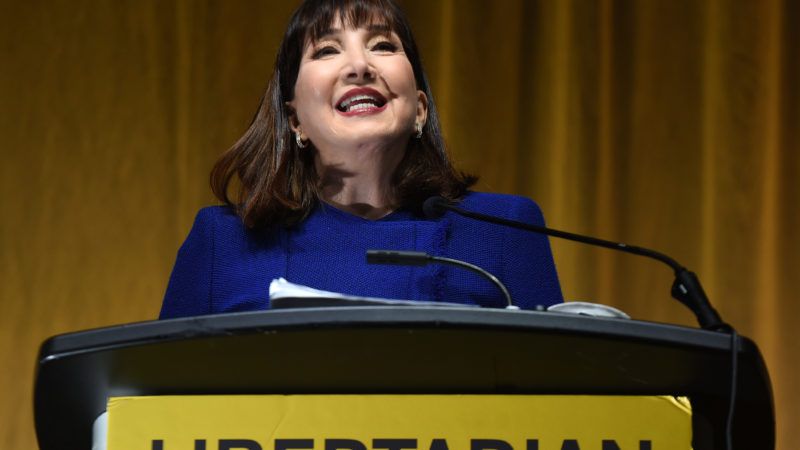Jo Jorgensen Heading Toward Second-Best Result in Libertarian Party History
The Libertarian presidential nominee is at 1.14 percent, has 1.58 million votes, and is ahead of all third-party candidates in every state. She's also beating the Trump-Biden spread in Michigan, Wisconsin, and Nevada.

With most of the Electoral College map filled out as of 9:30 a.m. ET the morning after election day, Libertarian Party (L.P.) presidential nominee Jo Jorgensen had already received the second-highest number of votes in her party's 49-year history: 1.58 million and counting.
Jorgensen, a psychology lecturer at Clemson and the 1996 running mate of L.P. stalwart Harry Browne, is currently at 1.14 percent of the national vote, a tick above the party's second- and third-best showings: Ed Clark's 1.06 percent in 1980, and Gary Johnson's 0.99 percent in 2012.
With votes still being tallied and nails still being bitten in several battleground states, Jorgensen's vote total currently exceeds the margin between President Donald Trump and former Vice President Joe Biden in three states: Michigan (+0.87 percentage points, with 90 percent of ballots counted), Wisconsin (+0.51, with 97 percent counted), and Nevada (+0.27, with 87 percent).
Though 1.14 percent marks a steep drop-off from Gary Johnson's 3.28 percent in 2016, there are several reasons for the L.P. to see the glass half-full in these results. For one, Jorgensen beat every other third-party and independent candidate in all 50 states and the District of Columbia. (Sorry, Kanye.) The Libertarian is quintupling Green Party nominee Howie Hawkins' current total of 0.23 percent.
Around 57 percent of all voters who selected neither Democrat nor Republican for president in both 2012 and 2016 chose the Libertarian; this year that share will be jacked up closer to 69 percent. With massive leads in party registration, number of elected officials (including a freshly elected member of the Wyoming state house), and ballot access, the L.P. over the past decade has become the third party in the United States.
All this with a candidate who has significantly lower name recognition than 2008 nominee Bob Barr, the former Republican congressman who switched back to the GOP (as did his Las Vegas pitchman running mate Wayne Allyn Root) after winning just 0.4 percent of the vote.


Show Comments (342)